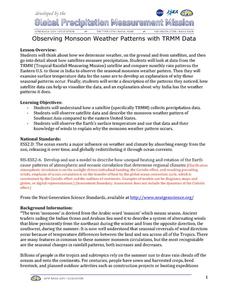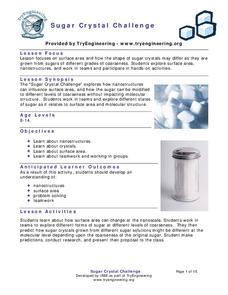Exploratorium
Motor Effect
The magnetic wire. Class members create a magnetic field by running electricity through a wire. The video included in the resource provides information on how this effect is used to make electrical motors.
Teach Engineering
Earthquakes Living Lab: Locating Earthquakes
There are patterns in nearly everything — even earthquakes. Pairs research current earthquakes to see if there are any patterns. They determine the mean, median, and mode of the earthquake data, along with the maximum and minimum. Using...
Teach Engineering
Combustion and Air Quality: Emissions Monitoring
Help your class determine the types of pollutants coming from vehicle exhaust. Groups use an air quality monitor to determine the emissions from different vehicles, to gain knowledge about combustion energy, and to predict how the...
Teach Engineering
Exploring the Lotus Effect
The Lotus Effect ... is it not some kind of yoga pose. In the last installment of a nine-part series, young scientists observe the Lotus Effect on lotus leaves and water-repellent cloths. They observe how motion and damage affect the...
Rochester Institute of Technology
Molecules and Fuel Cell Technology
A fuel cell is where the jailer keeps gas guzzlers. Scholars review chemical reactions, chemical bonds, and chemical structure in order to apply these concepts. Participants construct fuel cell kits, using electrolysis to run the car and...
Teach Engineering
Introduction to Water Chemistry
What are the issues surrounding water quality? Viewers of this short presentation gain information about the importance of clean water, the lack of fresh water, water contamination, and ways that engineers treat water.
Teach Engineering
Introduction to Environmental Engineering
A series on environmental engineering introduces the class to issues that environmental engineers work to solve. This first instructional activity focuses on air and land issues, and looks at ways to reduce pollution.
NOAA
A Day in the Life of an Ocean Explorer
What's life like aboard an ocean exploration vessel? Junior oceanographers examine the important role of communication in ocean research in lesson two of a five-part series from NOAA. The materials introduce the class to life on board...
NASA
Observing Monsoon Weather Patterns with TRMM Data
Follow a fabulous slide show on how monsoons form and how satellite technology is being used to observe the phenomena, explaining why they occur. Afterward, visit the TRMM (Tropical Rainfall Measuring Mission) website to access actual...
Cornell Cooperative Extension
Rope Making
Jump ropes, dock lines, cables. The science and technology behind rope making is the focus of a seven-page packet that ends with a rope making challenge.
Curated OER
Genetics: A Library/Research Skills and Technology Lesson Plan
Genetic issues, inherited diseases, and genetic engineering are hot topics in scientific fields and provide an opportunity for young scientists to develop their research and presentation skills. Each class member chooses a topic, locates...
Teach Engineering
Mechanics of Elastic Solids
Make the connection between Hooke's law and elasticity with an activity that introduces the class to the behavior of elastic materials. The resource defines stress and strain to calculate the modules of elasticity of materials and also...
Curated OER
AP: Chapter 20: DNA Technology
This nine-page biotechnology resource contains six pages of questions regarding DNA technology. Questions cover cloning, restriction enzymes, the polymerase chain reaction, different techniques, the human genome project, and more. The...
Teach Engineering
Energy Basics
Power up your lessons with an energetic resource. Scholars learn about work, force, energy, and power. They consider the relationships between these quantities through hockey puck scenarios and make calculations using formulas.
Teach Engineering
Energy Efficiency
Using the resource is probably the most efficient way to learn about efficiency. The 18th installment of a 25-part Energy Systems and Solutions unit has pupils investigate energy efficiency through discussions and associated activities....
TryEngineering
Sugar Crystal Challenge
Be sure to use this sweet resource. Scholars perform an experiment using sugar to investigate how surface area relates to the coarseness of sugar. They consider how this concept connects to nanotechnology.
Teach Engineering
A New Angle on PV Efficiency
Let me get an angle on this! Investigate the orientation of a photovoltaic panel and its effect on efficiency. By using a light source, learners collect and plot current output to determine the ultimate orientation. The resource includes...
Institute of Electrical and Electronics Engineers
Chair Lift Challenge
During the Winter Olympics, this would be an engaging task to include in your STEM lesson. Design teams plan, construct, and test a miniature ski lift that can carry a pingpong ball up and down a rope line without falling out. With this...
Practical Action
Floating Garden Challenge
Climate change is affecting communities living in riverside areas by flooding land where crops used to grow. Using an array of instructional materials provided in this resource, you will have the opportunity to task your critical...
NASA
Applying Newton’s Laws
Newton's Laws get the rocket to work, but do they serve any other functions? A six-page resource classifies rockets by the type of propellant they use. It then describes applications of Newton's Laws of Motion, both in the ability to...
Teach Engineering
Earthquakes Living Lab: FAQs about P Waves, S Waves and More
Let's talk about earthquakes .... Using the Internet, pupils research what causes earthquakes, how scientists measure them, their locations, and their effects. The resource is not only informative, but it also builds crucial research...
Teach Engineering
Earthquakes Living Lab: Finding Epicenters and Measuring Magnitudes
Pairs use an online simulation to determine the epicenter and magnitude of an earthquake. Using real data about the earthquake's maximum S wave amplitudes, they then determine the magnitude. The resource provides a great career...
Teach Engineering
Backyard Weather Station
Challenge young meteorologists to apply their knowledge of weather to build their own weather stations. The resource provides the directions to build a weather station that contains a wind vane, barometer, thermometer, and rain gauge....
Kenan Fellows
Effects of a Golf Course on Stream Health
Is the golf course causing issues in the stream? Find out with a resource that has groups perform chemical water tests to analyze the effects of a golf course on a stream. Pupils collect water above and below the course and analyze the...
Other popular searches
- Computer Lab Behavior
- Computer Lab Safety Rules
- Technology Resources Word
- Computer Lab Activities
- Computer Lab Rules
- Computer Lab Safety
- Computer Lab Projects
- Computer Lab Lessons
- Computer Lab for Equations
- Safety in Computer Lab
- Computer Lab Procedures
- Integer Computer Lab

























